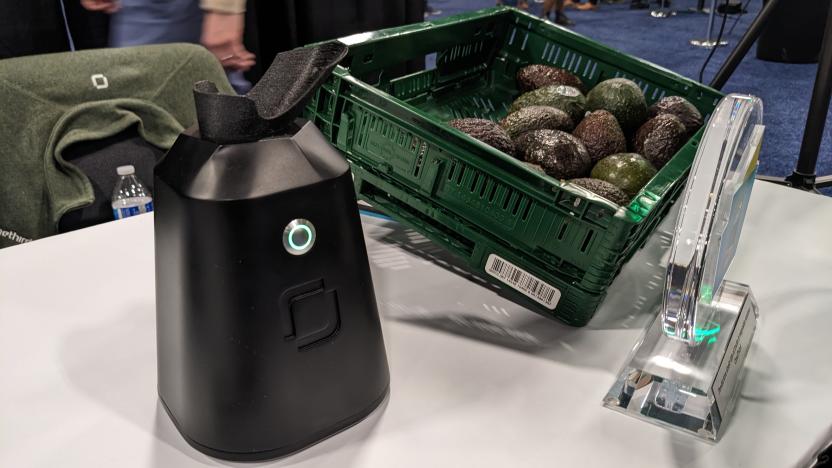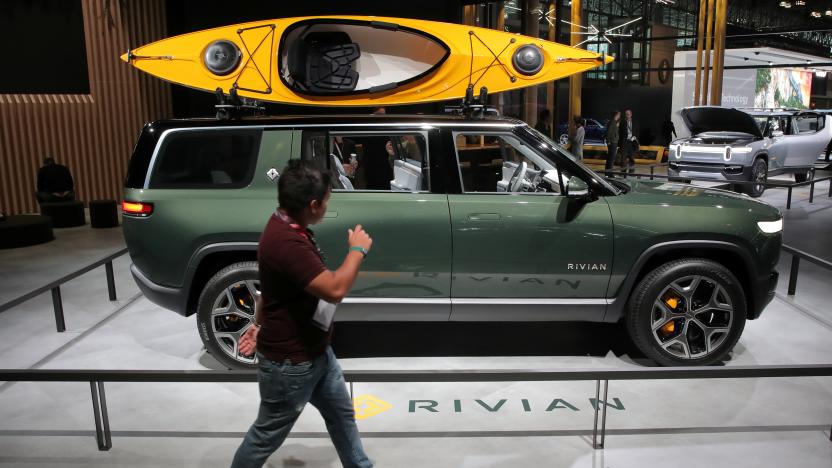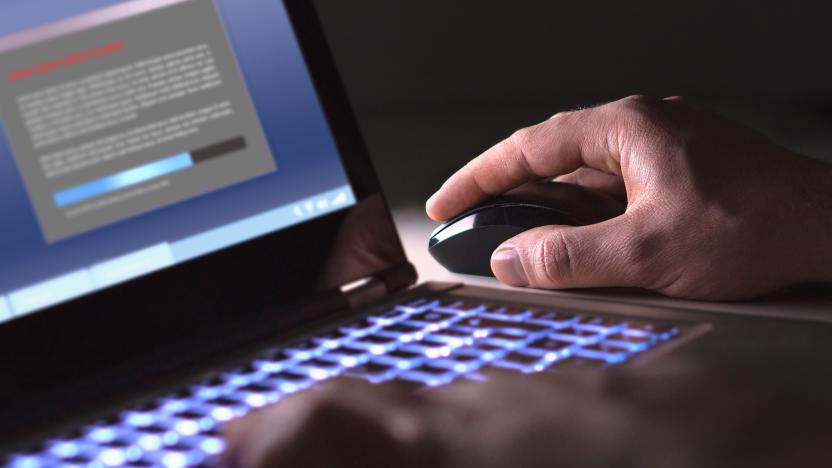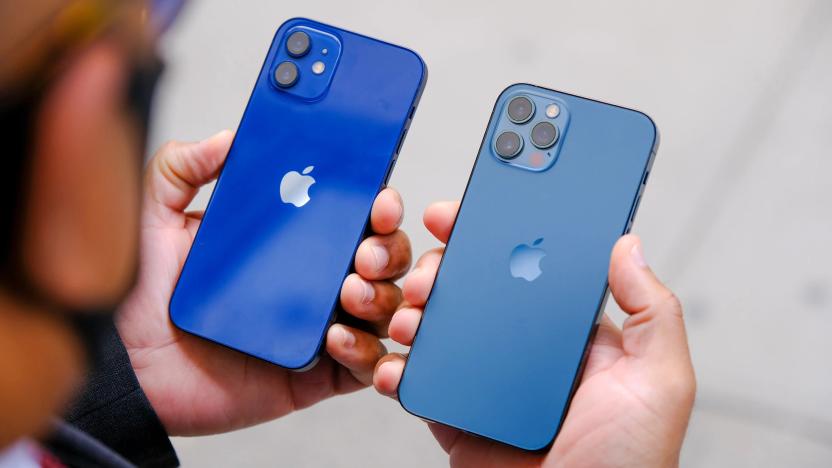supply chain
Latest

Finally, a fruit scanner that will tell you if your avocados are ripe
The OneThird freshness scanners use proprietary algorithms and near infrared lasers to tell you if your guacamole will be a success or not.

Rivian pushes back deliveries of its R1S SUV once again
Customers who pre-ordered the electric SUV received the news by email.

Nike is opening a 'technology center' in Atlanta next year
Nike's Atlanta Technology Center will focus on supply chain, cybersecurity and AI work.

Apple's worst shipping delay is for a $19 polishing cloth
Apple is facing shipping delays for many products, but its biggest wait is for... a polishing cloth.

Hackers conduct one of the largest supply chain cyberattacks to date
Kaseya is warning of one of the largest supply chain ransomware attacks to date, with over 200 companies affected.

Apple says selling new iPhones without power adapters will save 861,000 tons of metal
The company highlighted carbon capture and energy efficiency in its 2021 Environmental Progress Report.

Biden will review tech supply chains to reduce dependence on China
President Biden is reviewing supply chains for processors, batteries and other key tech companies to reduce dependence on China.

Apple says its products will be carbon-neutral by 2030
Apple promises to make its supply chain and all of its products carbon neutral by 2030.

Volvo will use blockchain to prove its cobalt wasn’t mined by children
The dark side of electric vehicle production is that the lithium ion batteries most EVs run on require raw materials like cobalt, and cobalt mines have become notorious for using child labor. Now that Volvo has revealed its first fully-electric car, the XC40 Recharge, the automaker wants to ensure sure that the raw materials in its lithium ion batteries are sourced responsibly. For that, it's turning to blockchain.

Researchers suggest 100 percent renewable energy isn’t very green
In order to keep global temperature rise below 1.5 degrees Celsius, we'll need to rely on renewable energy, electric vehicles (EV) and battery storage. But creating that infrastructure will dramatically increase our need for metals like cobalt and lithium. A report released this week cautions that a spike in demand for those and other metals could drain the planet's reserves and lead to dire social and environmental consequences.

If Apple announces a wearable that's not available until next year...
It'll be genius*. In no small part because, as of right now, no one has reported seeing a single millimeter of the device. If Apple shows off what it has been cooking but delays manufacture until later this year, it will also be one of the bigger tactical shifts for Apple during Tim Cook's tenure. Cook is a supply chain wizard, going back to why he was recruited from Compaq, having previously spent years at IBM. The fact that Apple may even be locking up the shipping channels, giving them a physical advantage in actually getting product into stores at the expense of competitors (hi, Samsung!), clearly shows Cook's savvy as a business leader. The supply chain in China is typically the weakest part of Apple's secret process. Even bringing manufacturing to America can't hide things like a sapphire glass plant, dug up by Mark Gurman some time ago. Yet he, nor MacRumors, AppleInsider -- none of the rumor sites have managed to capture a wire or screen or strap of the rumored wearable. Why? It likely hasn't gone into mass production yet. You can't leak what you aren't making. Jobs perhaps wouldn't have done this, but that is academic. He certainly had a flair for the dramatic and was able to keep things quiet, for the most part. The reality is what it is, however, and the best way to keep secrets these days is to keep your cards very close. Look at how Swift was kept under wraps for years. No one in the media reported Swift in advance, not even so much as a hint. Until Apple can build a campus somewhere high in the mountains (or perhaps a helicarrier like S.H.I.E.L.D.), the leaky supply chain will continue to tip its hand. Personally, I'm looking forward to being pleasantly surprised tomorrow. *Perhaps the only thing that would be more amazing would be hearing the product is ready to ship. It's not unprecedented to have a new product stay secret, as we had almost no supply chain leaks for the original iPhone or iPad. The iPhone was also announced first, then shipped some time later. Once people know what to look for it seems to be harder to keep things secret.

Apple joins President Obama's 'SupplierPay' initiative
US President Barack Obama has extended the so-called QuickPay initiative to the private sector with "SupplierPay," and Apple (among others) has come on board. SupplierPay requires companies to pay their suppliers within 15 days of receiving an invoice. The thought is that the program keeps these companies from having to borrow money. Now, Apple, IBM, Coca-Cola and others have agreed to pay their small component suppliers more quickly. Apple is a proactive advocate of supply chain responsibility. For instance, its 2014 Supplier Responsibility Report highlighted progress made in securing tantalum, an important metal used in the manufacture of electronic equipment.

Keeping an eye on working conditions across Apple's vast supply chain is no easy task
Bloomberg Businessweek yesterday posted a gripping tale detailing the inherent challenges faced by Apple as it tries to promote fair working conditions across its supply chain. The Bloomberg piece zeroes in on life at Flextronics in the weeks preceding Apple's iPhone 5 launch. Based out of Singapore, Flextronics was tasked with manufacturing the iPhone 5's camera before shipping them off to China. With factories spread out across the globe, it used its factory space in Kuala Lumpur, Malaysia to handle iPhone 5 camera production. What follows is a fascinating tale detailing how Flextronics tapped into an extensive network of recruiters to amass a workforce large enough to handle Apple's massive product orders. Massive is a bit of an understatement as Apple ended up selling the iPhone at a rate of 3.7 million units a week for several months after the launch. Some of the workers hired to meet these product demands came from as far away as Nepal. And that's where the story really begins. What ensued, according to Taparia and the others, was a frenzy. Even the Nepalese government official in charge of approving foreign-worker permits, Surya Bhandari, says he was deluged with calls from Malaysia and Nepal urging him to issue permits faster and to waive a mandated seven-day waiting period. "They pressured me," recalls Bhandari, now retired. They also told him the men were needed to work on iPhones and that sending men to work for Apple would be good for Nepal. The hunt reached then-27-year-old Bibek Dhong on his mobile phone, while he was packing milk crates at a Kathmandu dairy to support his wife, a newborn daughter, and his extended family. The call would change his life. The article recounts how workers like Dhong are often put into positions where they feel forced, or perhaps strongly compelled, to take out loans for commission payments to a hierarchy of recruiters, who provide access to these coveted manufacturing jobs. What's worse, some employees aren't always able to go back to their home countries on account of intra-country politics and bureaucracies. That's just the briefest of recaps -- the entire article is well worth checking out as it helps color the massive manufacturing machine that is Apple. The article is by no means a referendum against Apple. Indeed, Apple has taken more action than most other tech companies to ensure worker abuse is curtailed as much as possible. Still, the article highlights the daunting challenges involved when overseeing a complex supply chain that spans continents and encompasses thousands of workers.

Reuters sources predict shortage for unannounced iPad mini with Retina display
It's little more than a rumor at this point, but stories of delays and shortages have been circulating for about as long as mentions of an iPad mini with Retina display. Reuters spent the morning adding a bit more fuel to that proverbial fire with its own band of anonymous sources. The "people who work in the company's supply chain" confirmed that there have been issues bringing a higher res tablet to market -- issues that may, in fact, impede Cupertino's ability to capitalize on the ever-important holiday push. The refreshed mini is still apparently set for an October release according to the aforementioned unnamed informants, but it "could be available in only limited quantities this year." As to what's actually causing said shortage, no can say for sure, though word is that Apple's own certification process around power consumption may have thrown a wrench in the proceedings.

The logistics behind transporting millions of iPhones from China to stores worldwide
Apple yesterday announced that its fleet of next-gen iPhones will hit store shelves on September 20. For most people, this means that they simply have to lace up their shoes and head on over to their local Apple retail store pick one up. For Apple, it means that they have nine days to ensure that millions of iPhones emanating from China will ready for purchase at storefronts worldwide. It's a logistical exercise on the grandest of scales, especially considering that Apple routinely sells millions of new devices during launch weekend. Bloomberg today published an fascinating article detailing the innumerable procedures that make up this incredibly complex operation that, when all goes according to plan, stays hidden from public view. The process starts in China, where pallets of iPhones are moved from factories in unmarked containers accompanied by a security detail. The containers are then loaded onto trucks and shipped via pre-bought airfreight space, including on old Russian military transports. The journey ends in stores where the world's biggest technology company makes constant adjustments based on demand, said people who have worked on Apple's logistics and asked not to be identified because the process is secret. The report relays that many of Apple's current practices were "built up" under the watchful eye of Tim Cook who for many years served as Apple's COO and dutifully implemented measures to make Apple the smooth and efficient machine it is today. As for shipping iPhones worldwide, Apple actually begins that process before they are unveiled to the public, moving large shipments of iPhones to distribution centers around the world. Naturally, these shipments are steadily monitored by security guards at all times, "from truck depots, airports, customs and storage warehouses until the product is finally unveiled." While shipping finished products across the globe is one thing, there's another aspect to the logistics machine that isn't often discussed, namely getting all of a device's components together so that the assembly process can begin. The logistics for a new gadget start months before it is unveiled, said the people with knowledge of the process. Apple first coordinates flights and trucks to move components from suppliers to assembly plants in China. Teams from sales, marketing, operations and finance collaborate to forecast how many devices the company expects to sell, said the people. When it comes to shipping iPhones to the US, Bloomberg reports that Apple employs FedEx to carry its precious cargo from China to Memphis, Tenn., where the company is headquartered. As a point of interest, the Boeing 777s FedEx uses cost "about US$242,000 to charter" and can accommodate 450,000 iPhones. The entire article is worth reading as it provides some fascinating insights into the grandiose, and yet silent, mechanisms that enable Apple to operate so efficiently. Whether it's tweaking internal forecasts regarding how many iPhones need to be produced or adjusting the allocation of handsets based on regional fluctuations in demand, Apple stays atop of even the most minute details to keep things running smoothly.

Apple creates academic advisory board to oversee its Supplier Responsibility program
As part of Apple's ongoing efforts to improve labor practices in its supply chain, the company recently formed an academic advisory board to oversee its Supplier Responsibility program. The academic advisory board, which is an all-volunteer group, will be comprised of eight professors from renowned US universities and chaired by Brown University Professor Richard Locke. The Watson Institute reports that the advisory board will make recommendations about Apple's current practices and commission new research with the intent of improving labor practices and working conditions not just in regards to Apple but across the board. Locke hopes that the board will shape the practices of Apple and its suppliers so that the millions of employees involved in Apple's supply chain work under safe and fair conditions, in which "they are paid living wages, work within the legal work hour regimes, [and] work in environments that are safe and where they can express their rights as citizens. While Apple has taken a lot of heat in the media over its labor practices, the company, especially with Tim Cook at the helm, now appears to be a lot more focused and transparent about its efforts to improve the working conditions of the folks who manufacture its products.

Pegatron reportedly nabs 50 to 60 percent of iPad mini orders, breaks up Foxconn's monopoly
While folks are waiting for their precious new iPhones to arrive on their doorsteps, word has it that the leaky iPad mini has unsurprisingly entered mass production, but with a twist. According to today's front page news on Taiwan's Economic Daily News, reports from two local securities firms claim that Pegatron's managed to nab a staggering 50 to 60 percent of iPad mini orders from Apple, meaning Foxconn is finally no longer the sole assembler of iPads. Together (plus component suppliers Foxlink, AUO, TPK and others), both companies will apparently be able to churn out up to 5 million iPad minis monthly. Then there's the iPhone 5 as well: the paper says at least 53 million units are expected to be shipped this year, therefore Apple's adding Pegatron to the assembling front line as early as Q4 in order to maintain a steady supply of products. Obviously we can't use this information alone to deduce whether Apple is moving away from Foxconn, but as long as people get their iDevices then it's all dandy.

Sony postpones Nasne NAS due to quality control issues
Due to a quality control hiccup just one day before the Nasne was due for release in Japan, Sony has been forced to postpone it. The product combines a networked recorder with 500GB of storage and can be used to stream TV and other media to a range of Sony devices including the PS3, Vita, VAIO, Tablet and Xperia phone ranges -- potentially becoming a key example of Kaz Hirai's "One Sony" strategy. Judging from the official explanation of the problem, it sounds like some goods were simply damaged while being transported and hence the delay shouldn't last long.

Gartner: Apple turns over inventory every five days
Technology research firm Gartner is always coming up with innovative ways to compare companies and publish their relative ranks in terms of one criteria or another. Last week, Gartner published the results of its 2012 Supply Chain Top 25, and Apple was at the top of the list. On a scale of 1 to 10, Apple pulled in a composite score of 9.69, about 80 percent higher than second-place company Amazon and a full 436 percent higher than #24 HP. That score is based on a number of factors, including the opinion of corporate peers and Gartner analysts, the weighted three-year return on assets, and inventory turns. That last figure is a measure of how quickly a company can turn over its inventory. For Apple, that number comes out to 74.1 times per year -- essentially once about every five days. The only company that bests Apple in inventory turns is McDonalds, not surprising when you consider that the company has to work with perishable food items. Apple's inventory turn figure indicates that every item in your local Apple Store, for example, stays there no longer than about five days before being sold. Why is this number important? By reducing inventory holding costs and moving product more quickly from manufacturing to consumers, Apple is able to keep costs low and margins high, all of which contributes directly to the bottom line. [via The Atlantic]

China Times: HTC wants to develop its own processors for low-end phones
Encroaching into the semiconductor business might not seem the most obvious move for a phone manufacturer that's trying to unify its efforts. Nevertheless, China Times reports that HTC has signed a "memorandum of cooperation" with ST-Ericsson to co-develop a new dedicated chip for low-end handsets coming out next year. Since ST-Ericsson is a fabless chip designer, HTC won't risk getting silicon between its fingernails. Instead, if this agreement is what it seems, the Taiwanese manufacturer may simply want more direct control over its supply chains and to reduce its current reliance on ready-made designs from Qualcomm or NVIDIA. After all, it can't be easy for HTC's new CFO, looking on while others gobble up those margins.











